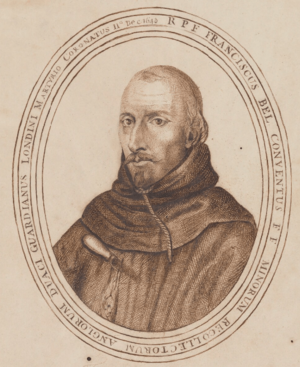Arthur Bell (martyr) facts for kids
Quick facts for kids BlessedArthur Bell aka "Francis" Bell OFM |
|
|---|---|
 |
|
| Martyr | |
| Born | 13 January 1590 Temple-Broughton near Worcester, England |
| Died | 11 December 1643 (aged 53) Tyburn, London, England |
| Venerated in | Roman Catholic Church |
| Beatified | 22 November 1987 by Pope John Paul II |
| Feast | 11 December, 22 November (with the martyrs of England and Wales) |
Arthur Bell (born January 13, 1590 – died December 11, 1643) was an English Franciscan friar. He is known as a martyr because he died for his Catholic faith. During the English Civil War, it was against the law to be a Catholic priest in England. Arthur Bell was found guilty of this and was executed in London. Later, in 1987, Pope John Paul II declared him "Blessed."
Contents
Early Life and Education
Arthur Bell was born on January 13, 1590, in Temple-Broughton, near Worcester. His father, William Bell, was a lawyer. When Arthur was eight years old, his father passed away. His mother then placed him in the care of her brother, Francis Daniel. Francis Daniel was a wealthy and educated man.
When Arthur was 24, he began his studies at the English college in St.-Omer. He later moved to the St. Alban's College in Valladolid, Spain. There, he continued and finished his education.
Becoming a Franciscan Friar
On August 8, 1618, Arthur Bell joined the Franciscan Order in Segovia, Spain. He took the religious name Francis. After completing his training and becoming a priest, he was asked to help rebuild the Franciscan community in England.
He became one of the first members of the Franciscan group in Douai. There, he taught as a professor of Hebrew. He also served as the guardian, which is the leader of a friary. Arthur Bell was very good at languages. He knew Latin, Hebrew, Greek, Spanish, French, Flemish, and English. One of his students was Henry Heath.
While in Douai, Bell published a book that included his father's will and his own religious ideas. He also worked as a chaplain for the Poor Clares, a group of nuns, in Gravelines. Later, he moved to Brussels. By this time, the English government was aware of him.
Work in Scotland and England
In 1632, Arthur Bell was sent to Scotland. He was the first leader of the Franciscan group there. However, his efforts to re-establish the order in Scotland were not successful.
In 1634, he returned to England. He continued his religious work there until November 1643. At that time, he was arrested by soldiers in Stevenage, Hertfordshire. They suspected him of being a spy.
When his papers were searched, it was discovered that he was a Catholic priest. Because it was against the law to be a Catholic priest in England during that time, he was sent to Newgate prison.
Trial and Execution
Arthur Bell was found guilty of being a priest. The trial showed how dedicated he was to his Catholic faith. He was ready to suffer for what he believed.
When he was sentenced to death, it is said that he began to sing a solemn Te Deum, which is a hymn of praise. He also thanked the judges for allowing him to die for Christ. He was executed in London.
Writings
Arthur Bell wrote a book called The History, Life, and Miracles of Joane of the Cross (published in St.-Omer, 1625). He also translated a Spanish book by Andrew a Soto. This translated book was titled A brief Instruction how we ought to hear Mass (published in Brussels, 1624).
See Also
- St. Arthur of Glastonbury
- St. Thomas More
- Eighty-five martyrs of England and Wales
- Thomas Bullaker
- Walter Colman
 | Selma Burke |
 | Pauline Powell Burns |
 | Frederick J. Brown |
 | Robert Blackburn |

